Take a look at this video that compares the efforts of two human interpreters against interpretation provided by the AI app, Kudo. The results? Less weighted against AI than you might think.
The human interpreters found some of the language employed by their AI counterpart “borderline nonsensical,” and observed that pauses in speech confused the interpretation app. But in cases where the speaker was throwing out a torrent of words, AI did better, they allowed. “I was taken aback,” said one, that the app conveyed all of the content.
These, of course, are the early days of this technology. At the moment, neither of the humans felt it was ready for situations where a lot is at stake — such as negotiations among nations, courtrooms and medical environments. But to watch the video is also to realize that big changes are right around the corner.

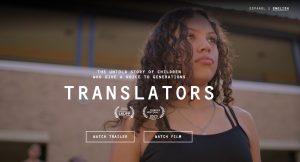
 Get a handle on understanding the effect of traumatic stress on children who have been displaced and relocated by force in this free webinar, Traumatic Stress Among Refugee Children and Youth, set for noon to 1:30 pm, Wednesday, June 21.
Get a handle on understanding the effect of traumatic stress on children who have been displaced and relocated by force in this free webinar, Traumatic Stress Among Refugee Children and Youth, set for noon to 1:30 pm, Wednesday, June 21.

 The New York Times recently took a crack at explaining the latest permutation of diversity training in this story: Why Some Companies Are Saying ‘Diversity and Belonging’ Instead of ‘Diversity and Inclusion.’
The New York Times recently took a crack at explaining the latest permutation of diversity training in this story: Why Some Companies Are Saying ‘Diversity and Belonging’ Instead of ‘Diversity and Inclusion.’ Did your patients postpone well-child visits and immunizations during three years of worry about COVID-19? Here are reminders in
Did your patients postpone well-child visits and immunizations during three years of worry about COVID-19? Here are reminders in  A recent Tip of the Week reported on research showing that
A recent Tip of the Week reported on research showing that  Communicating health risks in an emergency to immigrant, refugee and migrant communities can be tricky. Get help via this best practices webinar, set for Tuesday, May 9, noon
Communicating health risks in an emergency to immigrant, refugee and migrant communities can be tricky. Get help via this best practices webinar, set for Tuesday, May 9, noon In case you missed it until now, here’s a lively online exhibition offered by the Smithsonian Institution. The Bias Inside Us sets out to:
In case you missed it until now, here’s a lively online exhibition offered by the Smithsonian Institution. The Bias Inside Us sets out to:
 If you’re interested in the life span of languages, here’s an intriguing story in the New York Times,
If you’re interested in the life span of languages, here’s an intriguing story in the New York Times, 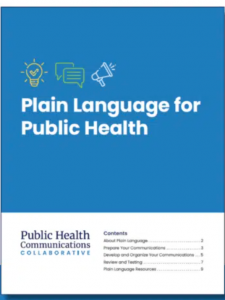 Here’s help on getting your health messages across in a way that most people can understand. Check out a new resource from the
Here’s help on getting your health messages across in a way that most people can understand. Check out a new resource from the  Good news if you happen to be an athlete, bus mechanic, or short order cook. Those professions are judged to be least affected as artificial intelligence becomes, well, more intelligent, according to a paper published in March by University of Pennsylvania and Open AI researchers,
Good news if you happen to be an athlete, bus mechanic, or short order cook. Those professions are judged to be least affected as artificial intelligence becomes, well, more intelligent, according to a paper published in March by University of Pennsylvania and Open AI researchers, 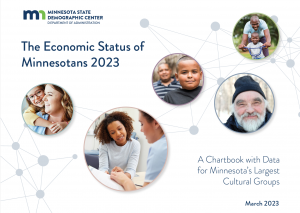 Get a close look at the continuing deep economic disparities among Minnesota’s different cultural groups in “The Economic Status of Minnesotans 2023,” a new report by the Minnesota State Demographic Center.
Get a close look at the continuing deep economic disparities among Minnesota’s different cultural groups in “The Economic Status of Minnesotans 2023,” a new report by the Minnesota State Demographic Center. English, Hmong, Somali and Spanish speakers can get easier access to care and treatment — and suffer less risk of serious disease — through a telehealth partnership between the Minnesota Department of Health and Cue Health.
English, Hmong, Somali and Spanish speakers can get easier access to care and treatment — and suffer less risk of serious disease — through a telehealth partnership between the Minnesota Department of Health and Cue Health. If you’re on the lookout for shocking statistics, here are some from a recent New York Times story,
If you’re on the lookout for shocking statistics, here are some from a recent New York Times story,  Here’s a free virtual symposium sponsored by the National Library of Medicine that will help you beat back the plethora of misinformation that keeps people from getting quality care. Set for April 4-6, a team of presenters will provide information in these areas:
Here’s a free virtual symposium sponsored by the National Library of Medicine that will help you beat back the plethora of misinformation that keeps people from getting quality care. Set for April 4-6, a team of presenters will provide information in these areas: Take a look at this New York Times article —
Take a look at this New York Times article —  Usually we’re concerned with the vicissitudes of communicating across language barriers. But here’s another way to think about how you’re interacting with patients. Recently the New York Times explored a few of the unspoken pitfalls by which patients get a message far removed from your intentions.
Usually we’re concerned with the vicissitudes of communicating across language barriers. But here’s another way to think about how you’re interacting with patients. Recently the New York Times explored a few of the unspoken pitfalls by which patients get a message far removed from your intentions. President Joe Biden announced new restrictions on people fleeing conditions in Cuba, Nicaragua, Venezuela and Haiti. Those who simply show up at the border without official paperwork will be denied entry, Biden declared.
President Joe Biden announced new restrictions on people fleeing conditions in Cuba, Nicaragua, Venezuela and Haiti. Those who simply show up at the border without official paperwork will be denied entry, Biden declared. So you’ve tested Covid positive but wonder what your next move should be. Here’s help — for free, and in English, Hmong, Spanish and Somali — for Minnesota residents who have shown Covid symptoms within the past five days. Download the
So you’ve tested Covid positive but wonder what your next move should be. Here’s help — for free, and in English, Hmong, Spanish and Somali — for Minnesota residents who have shown Covid symptoms within the past five days. Download the 
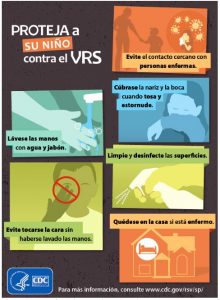
 As if being uprooted from your life isn’t tough enough for refugees and immigrants, there are more dangers once they arrive in the US. Among them: the scam artists waiting to take advantage.
As if being uprooted from your life isn’t tough enough for refugees and immigrants, there are more dangers once they arrive in the US. Among them: the scam artists waiting to take advantage. A recent story in the New York Times asked the question, Can Republicans and Democrats Find a Way Forward on Immigration? Reporter
A recent story in the New York Times asked the question, Can Republicans and Democrats Find a Way Forward on Immigration? Reporter  Among the consequences of the US collapse in Afghanistan, the war in Ukraine, and the disintegration of Venezuela: an even longer wait for refugee status for people from other parts of the world. The New York Times recently reported that thousands are left “living in limbo as delays in the U.S. refugee system stretch to an average of five years or more.”
Among the consequences of the US collapse in Afghanistan, the war in Ukraine, and the disintegration of Venezuela: an even longer wait for refugee status for people from other parts of the world. The New York Times recently reported that thousands are left “living in limbo as delays in the U.S. refugee system stretch to an average of five years or more.” The New York Times explores another tragic dimension of the immigrant and refugee experience in this story,
The New York Times explores another tragic dimension of the immigrant and refugee experience in this story,  True or False: Immigrants will take American jobs, lower wages, and especially hurt the poor.
True or False: Immigrants will take American jobs, lower wages, and especially hurt the poor. What happens when newly-arrived refugees get a year-long guaranteed income?
What happens when newly-arrived refugees get a year-long guaranteed income? After a lengthy hiatus, the Minnesota Immigrant and Refugee Health Network is back in business. The first meeting is set for 9:30-11 am, Tuesday, October 11.
After a lengthy hiatus, the Minnesota Immigrant and Refugee Health Network is back in business. The first meeting is set for 9:30-11 am, Tuesday, October 11.  Stuck in your search for translated health education materials for monkeypox? Here are resources to get you started when treating patients with limited English.
Stuck in your search for translated health education materials for monkeypox? Here are resources to get you started when treating patients with limited English. We’ve previously highlighted the excellent on-line news source,
We’ve previously highlighted the excellent on-line news source,  Wondered whether your health messages to refugees, migrants and immigrants are actually hitting the mark? Here’s a webinar sponsored by the National Resource Center for Refugees, Immigrants and Migrants where panelists will explain “cultural validation” — the practice of including refugee, migrant and immigrant communities in creating messages that are meaningful because they’re tailored to their cultures. Participants will learn about best practices from the just-developed
Wondered whether your health messages to refugees, migrants and immigrants are actually hitting the mark? Here’s a webinar sponsored by the National Resource Center for Refugees, Immigrants and Migrants where panelists will explain “cultural validation” — the practice of including refugee, migrant and immigrant communities in creating messages that are meaningful because they’re tailored to their cultures. Participants will learn about best practices from the just-developed 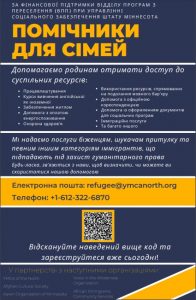 With hundreds of Ukrainian refugees landing in Minnesota, here are
With hundreds of Ukrainian refugees landing in Minnesota, here are 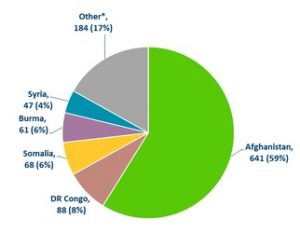
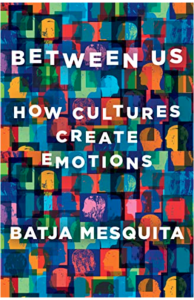 Usually we are concerned here with how to use language more effectively to understand others. Here’s another dimension of the effort to see the world as others see it. In Between Us: How Cultures Create Emotions, author Batja Mesquita explores the interaction between culture and emotion. Emotions, she maintains, are different in what she terms WEIRD cultures — Western, Educated, Industrialized, Rich and Democratic) — and most of the rest of the world.
Usually we are concerned here with how to use language more effectively to understand others. Here’s another dimension of the effort to see the world as others see it. In Between Us: How Cultures Create Emotions, author Batja Mesquita explores the interaction between culture and emotion. Emotions, she maintains, are different in what she terms WEIRD cultures — Western, Educated, Industrialized, Rich and Democratic) — and most of the rest of the world.

 Looking for direction on talking points and answers to tough questions about the newly-approved COVID vaccines for kids six months and older?
Looking for direction on talking points and answers to tough questions about the newly-approved COVID vaccines for kids six months and older? 
 In a health care environment it’s not the same as offering in-person interpretation, but recent additions to the languages offered by Google Translate help make the world a smaller place.
In a health care environment it’s not the same as offering in-person interpretation, but recent additions to the languages offered by Google Translate help make the world a smaller place.